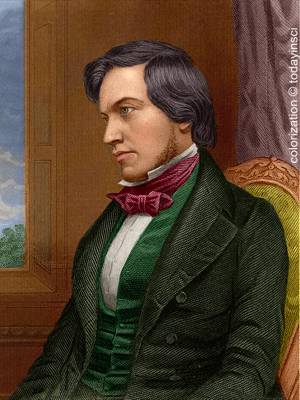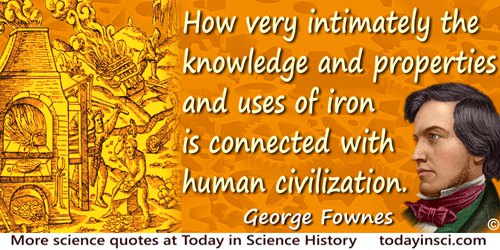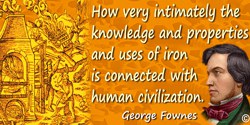 (source)
(source)
|
George Fownes
(14 May 1815 - 31 Jan 1849)
English chemist who prepared furfurine and benzoline (1845), the first examples of vegeto-alkali or organic salt-bases, as they were known then. Fownes was the first winner of the one hundred guineas (£105) Actonian Prize from the Royal Institution.
|
Science Quotes by George Fownes (5 quotes)
From very ancient times, the question of the constitution of matter with respect to divisibility has been debated, some adopting the opinion that this divisibility is infinite …. We have absolutely no means at our disposal for deciding such a question, which remains at the present day in the same state as when it first engaged the attention of the Greek philosophers, or perhaps that of the sages of Egypt and Hindostan long before them.
— George Fownes
In Elementary Chemistry, Theoretical and Practical (1854), 206. Note: this was the limit of knowledge, or even speculation, decades before the discovery of the nucleus, electron, proton and other particles.
The French kilogramme = 15,433.6 grains, or 2.679 lbs. Troy or 2.205 lbs. avoirdupoids.
— George Fownes
In Elementary Chemistry, Theoretical and Practical (1854), 104. [Note: this shows, at the time of writing, the grain was the preferred unit of mass.]
The term element is applied in chemistry to those forms of matter which have hitherto resisted all attempts to decompose them. Nothing is ever meant to be affirmed concerning their real nature; they are simply elements to us at the present time; hereafter, by new methods of research, or by new combinations of those already possessed by science, many of the substances which now figure as elements may possibly be shown to be compounds; this has already happened, and may again take place.
— George Fownes
In Elementary Chemistry, Theoretical and Practical (1854), 103. There follows on this page, 62 listed elements, some indicated as “of recent discovery and yet imperfectly known”. Two of the later names were Norium and Pelopium.
There are few substances to which it [iron] yields in interest, when it is considered how very intimately the knowledge and properties and uses is connected with human civilization.
— George Fownes
In A Manual of Elementary Chemistry, Theoretical and Practical (1858), 310.
Whatever plan of classification, founded on the natural relations of the elements, be adopted, in the practical study of chemistry, it will always be found most advantageous to commence with the consideration of the great constituents of the ocean and the atmosphere.
— George Fownes
Introducing sections on oxygen and hydrogen, in Elementary Chemistry, Theoretical and Practical (1854), 104.
See also:
- 14 May - short biography, births, deaths and events on date of Fownes's birth.
- The Actonian Prize - first awarded to George Fownes (1844) - from The Galaxy magazine (1872).
- George Fownes - Biography
- Galaxy Magazine (Jan 1872) - article on the Actonian Prize.
- George Fownes - Chemistry, as Exemplifying the Wisdom and Beneficence of God (1844).
- George Fownes - A Manual of Elementary Chemistry, Theoretical and Practical (1869), 10th ed.



 In science it often happens that scientists say, 'You know that's a really good argument; my position is mistaken,' and then they would actually change their minds and you never hear that old view from them again. They really do it. It doesn't happen as often as it should, because scientists are human and change is sometimes painful. But it happens every day. I cannot recall the last time something like that happened in politics or religion.
(1987) --
In science it often happens that scientists say, 'You know that's a really good argument; my position is mistaken,' and then they would actually change their minds and you never hear that old view from them again. They really do it. It doesn't happen as often as it should, because scientists are human and change is sometimes painful. But it happens every day. I cannot recall the last time something like that happened in politics or religion.
(1987) -- 


